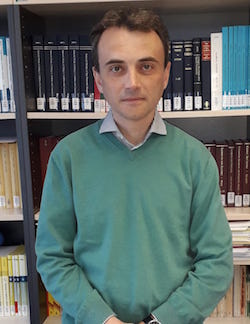 Prof. Dr. Gavril Farkas, a MATH+ Principal Investigator, member of the BMS Executive Committee and professor of algebraic geometry at the HU Berlin, has been awarded a European Research Council (ERC) Advanced Grant in the sum of 2.15 million euros.
Prof. Dr. Gavril Farkas, a MATH+ Principal Investigator, member of the BMS Executive Committee and professor of algebraic geometry at the HU Berlin, has been awarded a European Research Council (ERC) Advanced Grant in the sum of 2.15 million euros.
Farkas is considered one of the world’s leading experts in the field of algebraic curves. He achieved a breakthrough in his research by using new methods inspired from topology to prove Green’s conjecture about equations of algebraic curves. Farkas' research proposal "Syzygies, moduli and topological invariants of groups" won him one of the prestigious ERC Advanced Grants, which are considered the most important European awards for outstanding researchers. This lucrative grant will assist the top researcher in his scientific endeavours, and will also create new jobs as he can employ postdocs, PhD students and other staff for his new research team. Farkas will use the funding to continue to investigate the idea of connecting the different fields of algebra and topology.
Farkas is a Hungarian mathematician born in Transylvania and got his PhD in 2000 at the University of Amsterdam under the supervision of Gerard van der Geer. After positions at the University of Michigan, Princeton University and the University of Texas, Farkas took up a full professorship at the HU Berlin in 2007. His other awards and grants include the DFG Project "Syzygien und Moduli", the Ad Astra Prize for Excellence in Scientific Research, an Alfred P. Sloan Research Fellowship, and two National Science Foundation Research Grants.
Congratulations Gavril!
The ERC is a public body that was established in 2007 for the purpose of funding scientific and technological research conducted within the EU. Applications for grants are assessed by qualified external experts and the aim is to recognise the best ideas, and to confer status and visibility to the best research in Europe. ERC Advanced Grants are given to support the implementation of particularly innovative research projects. Demand for these grants is extremely high and, of the 2052 research proposals submitted to the ERC in the current round, only 11% were selected for funding.
Written by S. E. Sutherland-Figini





















